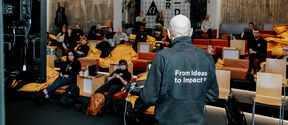Mobile devices accelerate speech processing research

Professor of Practice Tom Bäckström, who began at Aalto University Department of Signal Processing and Acoustics in August, believes that in the future phone calls will be possible with devices other than mobile phones.
‘We have many devices around us. Why not take advantage of the resources of all of them rather than making calls from a single phone', asks Bäckström.
Three things are needed in order for this to succeed.
'The first mathematical modelling challenge is how to isolate the desired signal from the many microphones that are available. Another challenge is achieving interoperability between random devices. The third involves privacy protection and data security, which means how we ensure that a phone call only goes to the right person.'
Bäckström and his research group are currently focusing on the first challenge: how to isolate the desired signal from the many microphones that are available. Protecting privacy is not the most difficult task, because a compression algorithm has already been identified as a potential solution for encryption.
Scientific work in the field ends up in products
Bäckström spent eight years living in Germany and has experience at the Fraunhofer research institute and the Friedrich-Alexander University that operates in close co-operation with it. At Fraunhofer, he was involved in developing a standard for better speech quality, which has just been completed.
'These standards help ensure that phones from different manufacturers can communicate with each other. The 3GPP Enhanced Voice Services (EVS) standard provides better audio compression and increases the efficiency of infrastructure use because it is the first speech coding standard that supports packet-switched networks like LTE,' says Bäckström.
In addition to standardisation work, Bäckström expects the future to offer more scientific work and major development as mobile devices help move theory through the software development process to products. Mobile devices present new challenges for the sector as the scientific foundation has to be rebuilt and updated.
'The field can process and revise existing theory and achieve a lot with small discoveries. Speech processing is a great field, because highly mathematical concepts and scientific work in general are incorporated into products in a relatively short time.'
Bäckström wants to remind people that acoustics and speech processing is a very broad field. The hottest topics in speech processing at this time include synthesis and speech recognition.
'Although speech recognition is exciting, it is only one area of speech processing. I encourage students to become familiar with the whole field and I'll try to fuel their enthusiasm,' says Bäckström in closing.
Photo: Aino Huovio
Read more news

Training available in AI, research data management, research ethics + more – register now!
New topics included! Registrations for spring 2026 are open.
New Innovation Postdoc programme launching this spring in Aalto
Innovation Postdoc launching this spring for AI researchers eager to turn cutting-edge research into real-world impact.
Expansive frontiers: tracing wilderness
Expansive Frontiers: Tracing Wilderness is a research project developed over a period of three months by doctoral researcher Ana Ribeiro, during her time as a Visiting Researcher in the Empirica Research Group at Aalto University






